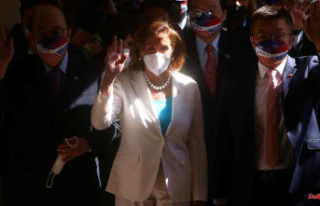Former Chancellor Schröder considers the fundamental points of conflict between Ukraine and Russia to be solvable. He outlines approaches in an interview with "Stern" and RTL/ntv. It will not work without talks on both sides. After another meeting with Kremlin boss Putin, he is sure that Moscow wants to negotiate.
During his visit to Moscow last week, former Chancellor Gerhard Schröder also met with Kremlin chief Vladimir Putin. The 78-year-old said that in an interview with "Stern" and RTL / ntv. Germany and the federal government, but also France, have a special responsibility. His impression, however, is that not enough is happening at the moment. But it is clear that "it won't work without talks," he said, with a view to ending the war against Ukraine. "I don't want to take anyone's mediation job away from anyone in government. But why should I stop talks that are legal and won't get me and my family into trouble?"
He continued: "The good news is that the Kremlin wants a negotiated solution. There was already a negotiation approach to the conflict between Ukraine and Russia, for example in Istanbul in March." The Turks are very helpful, "just as they are currently very helpful in negotiations about grain deliveries." A first success is the grain agreement, "maybe you can slowly expand that into a ceasefire," he said.
Schröder once again described the war as a "mistake by the Russian government". In his eyes, the problems "that are really relevant" can be solved. "The notion that Ukrainian President Zelenskyy would retake Crimea militarily is absurd. Except for the Tatar minority, this region is Russian; the former Soviet state and party leader Nikita Khrushchev gave it to Ukraine, which was then part of the USSR was." This could be "solved over the timeline, maybe not over 99 years like in Hong Kong, but in the next generation".
On the subject of NATO membership, Schröder said it was a "wise decision" by then-Chancellor Angela Merkel and her Foreign Minister Frank-Walter Steinmeier in 2008 to prevent Ukraine from joining. Even President Volodymyr Zelenskyy "said that there is an alternative, such as armed neutrality for Ukraine, without NATO membership, like Austria".
Schröder described the situation in the Donbass as more complicated. In the Minsk agreement, for example, it was agreed that the region "must remain part of the Ukrainian state network," "but at the same time there are greater rights for the Russian minority. But the Ukrainians have even abolished bilingualism in the Donbass. A solution based on the Swiss have to find a cantonal model."
"Concessions on both sides" are needed to resolve the conflict. It was "a big mistake to denigrate possible concessions by Ukraine as a Russian 'dictated peace' in advance," he said. But it will not work without the consent of the USA.
With a view to the friendship with Putin, Schröder ruled out a break. He has repeatedly condemned the war. "But would personal distancing from Vladimir Putin really do anyone any good?" he asked. "I made decisions, and I stand by them, and I made it clear: maybe I can be useful again. So why should I apologize?"
Schröder was Chancellor from 1998 to 2005. He then worked for various Russian state-owned companies in the energy sector, which brought him harsh criticism even before the outbreak of war.
You can find the whole interview at Stern plus and from Thursday in the current issue of "Stern" at the kiosk.












